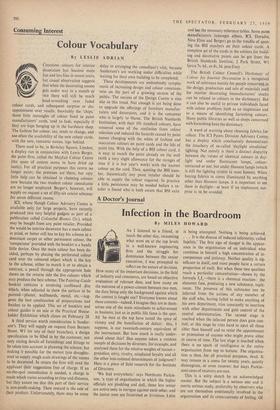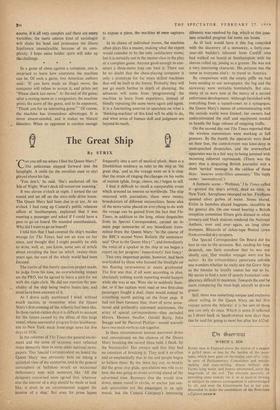A Doctor's Journal
Infection in the Boardroom
By MILES
HOWARD As I listened to a friend, at lunch the other day, recounting what went on at the top levels in a well-known engineering firm and the struggle for dominance between the senior executives, I was prompted to reflect on the nature of decision. How many of the important decisions, in the field of industry and commerce, are based on objective evaluation of relevant data, and how many on the outcome of a power-contest between two men, the data being only the background against which the contest is fought out? Everyone knows about these contests—indeed, I imagine they are in them- selves one of the main stimulants to achievement in business, just as in public life fame is the spur. All he men at the top have tasted the spice of victory and the humiliation of defeat : this, I suppose, is our twentieth-century equivalent of the tournament. But how much is really under- stood about this? Has anyone taken a random sample of decisions by directors, for example, and analysed them for the relative weights of reason v prejudice, envy, rivalry, misplaced loyalty and all the other non-rational determinants of judgment? Here is a piece of field research for the Institute of Directors.
'We find everywhere,' says Northcote Parkin- son, 'a type of organisation in which the higher officials are plodding and dull, those less senior are active'only in intrigue against each other, and the junior men are frustrated or frivolous. Little
is being attempted. Nothing is being achieved. , . . It is the disease of induced inferiority, called Injelitis.' The first sign of danger is the appear- ance in the organisation of an individual who combines in himself a high concentration of in- competence and jealousy. Neither quality is sig- nificant in itself, and most people have a certain proportion of each. But when these two qualities reach a particular concentration—shown by the formula Is.15—there is a chemical reaction : the elements fuse, producing a new substance, injeli- tance. The presence of this substance can be inferred from the actions of any member of the staff who, having failed to make anything of his own department, tries constantly to interfere with other departments and gain control of the central administration. The second stage is reached when the infected person does gain con- trol; at this stage he tries hard to eject all those abler than himself and to resist the appointment or promotion of anyone who might prove abler in course of time. The last stage is reached when there is no spark of intelligence in the entire organisation from top to bottom. The organisa- tion is then, for all practical purposes, dead. It ' may remain in a coma for twenty years, quietly disintegrate, or even recover; but (says Parkin- son) cases of recovery are rare.
This is a witty sketch by an acknowledged master. But the subject is a serious one and it merits serious study, preferably by observers who are not themselves emotionally involved in the organisation and its cross-currents of feeling. Of course, it is all very complex and there are many variables; the more solemn kind of sociologist will shake his head and pronounce the illness Injelitance unanalysable, because of its com- plexity. I hope some bolder spirit will take up the challenge.
In a game of chess against a computer, one is surprised to learn how courteous the machine can be. Of such a game, two American authors said: 'If you have made an illegal move, the computer will refuse to accept it, and prints out "Please check last move." At the end of the game, after a mating move or a resignation, the machine prints the score of the game, and to its opponent, "Thank you for an interesting game." ' Of course, the machine has tremendous advantages. It is never absent-minded, and it makes no blatant blunders. When its opponent is careless enough to expose a piece, the machine at once captures it.
In its choice of individual moves, the machine often plays like a master, making what the expert would consider to be the only satisfactory move; but it is certainly not in the master class in the play of a complete game. Anyone good enough to con- struct a three-move trap can beat it. There can be no doubt that the chess-playing computer is only a prototype for far more skilled machines that will be built in the future. Probably they will not go much further in depth of planning; the advances will come from 'programming' the machine to learn from experience, instead of blindly repeating the same move again and again. It is a fascinating exercise to speculate on what a 'thinking-machine' of this kind will be able to do, and what areas of human skill and judgment are beyond its reach.



































 Previous page
Previous page